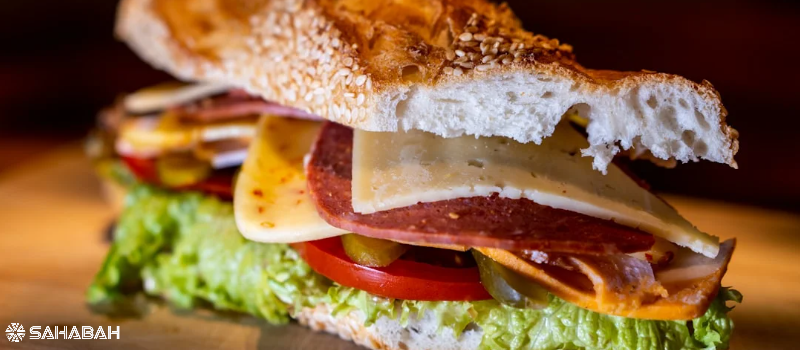Delifrance is a globally popular bakery chain known for its delicious breads, pastries and sandwiches. But is Delifrance halal? With over 1500 locations around the world, Muslim consumers want clarity on if Delifrance products meet Islamic guidelines.
This article provides an in-depth look at Delifrance’s halal status in 2023, outlining key information to help you make informed dining decisions.
A Closer Look at Delifrance
Delifrance is a French-inspired bakery franchise specializing in fresh breads, sweet baked goods and sandwiches. Originally founded in France, the chain has expanded to over 1,500 stores globally across Europe, Asia, the Middle East and beyond.
Singapore is home to 19 Delifrance outlets spread across the country. Locals and tourists alike frequent these cafes to enjoy:
- Artisan Breads – Freshly baked French baguettes, ficelles, whole wheat loaves and more
- Viennoiserie Pastries – Flaky croissants, fruit danishes, sweet brioches and other delicate baked delights
- Sandwiches – Hearty sandwiches served on crusty baguettes with both savory and sweet fillings
- Sweets – Macarons, tarts, cookies, celebration cakes and seasonal confections
- Breakfast Sets – Combinations that pair coffee with baked goods or eggs
- Kid’s Meals – Special kid-sized plates that include a sandwich, drink and treat
With an extensive product range focused on quintessential French fare, Delifrance attracts those seeking authentic tastes of Europe. Their signature bags loaded with assorted breads are especially popular take-home items and gifts.
Understanding Halal Food Standards
To appreciate if Delifrance qualifies as halal, it helps to first understand what designates food as permissible per Islamic law.
The Concept of Halal
Halal regulations serve to ensure food and drink meet religious dietary requirements. To carry an official halal certification, eateries must adhere to guidelines dictating:
- Acceptable Meat Sources – Animals must be slaughtered in the ritually prescribed manner. Pork and pork products are strictly forbidden.
- Permissible Ingredients – No alcohol or other intoxicants can be used as ingredients. Items such as gelatin, enzymes and additives must also meet standards.
- Preparation Methods – Processing and handling protocols must guarantee separation from anything deemed haram. This prevents cross-contamination.
Compliance guarantees Muslims can partake without compromising faith mandates. It also meets increasing demand for dedicated halal options.
Why Certification Matters
Obtaining formal halal certification from an approved third-party agency verifies an eatery or product is permissible per Islamic law. This provides definitive assurance.
Without certification or transparent disclosure of practices, patrons have no guarantee standards are upheld. They must rely on general inquiries that may yield vague answers or empty assurances.
Mandated regular audits give certified eateries higher accountability. Their ability to renew certification hinges on consistent, verified compliance.
For chains like Delifrance with numerous franchised locations across various countries, certification takes on added importance. It demonstrates a baseline commitment that franchisees must then uphold through dependable execution.
The Deal on Delifrance’s Halal Status
Given the brand’s global footprint spanning various religious and cultural contexts, halal adherence carries weight for Delifrance. Does the bakery deliver certainty to Muslim patrons?
Current Halal Certification Status
As of 2023, Delifrance outlets in Singapore do NOT have official halal certification. Applications have been previously submitted to the Islamic Religious Council of Singapore (MUIS) but rejected for reasons undisclosed.
Without this formal stamp of approval, Muslim consumers lack independent assurance that products definitively meet religious guidelines.
However, we will explore the availability of compliant menu items on a limited basis later on.
Why Pursuing Certification Matters
Obtaining halal certification would allow Delifrance to officially market itself as a bakery supportive of Muslim’s needs. This could significantly expand its customer base.
With no pork products baked on-site, they already comply with one major requirement. However, preparation protocols and ingredients sources likely need improvement to satisfy all criteria.
Committing to earn halal logo approval would compel company leaders to review all processes through the lens of religious permissibility. From supplier vetting to food handling methods to staff training, it takes full supply chain alignment.
The payoff is the capacity to unambiguously promote halal offerings to Muslim residents and tourists. This can drive sales given rising demand for compliant dining options.
Can Muslims Eat at Delifrance?
While Delifrance Singapore cafes presently lack halal certification, they do offer select products confirmed to meet guidelines. Menu availability and variety differs by location.
Halal Delifrance Breads
Certain classic breads are labelled as halal including:
- Baguettes – Delifrance’s signature French baguettes contain no illicit ingredients. Cheese or meat stuffed varieties must be avoided however.
- Whole Wheat Loaves – These hearty whole wheat breads use all halal components. An appetizingly healthy choice!
- Ficelles – Their famously skinny bread sticks (or ficelles) also steer clear of haram elements. Opt for sesame, oregano or original flavors over cheese incarnations to stay compliant.
Customers can identify halal breads through clear labels applied to packaging or shelf signage. Be sure to check for confirmation every time though in case of changes.
Ingredients for even plain bread varieties occasionally rotate depending on supply availability. Request clarification upfront if ever uncertain.
Halal Sandwiches and Sweets
In addition to verified halal breads, select Delifrance locations in Singapore have expanded halal options to include:
- Chicken Korma Baguette – Features tender chicken in a mildly spiced Indian-style curry sauce.
- Halal Beef Sandwiches – Both mini baguette sandwiches and full size subs with halal roast beef exist at some cafes.
- Halal Chocolate Croissants – Their classic crescent-shaped pastries made with imported halal chocolate.
- Assorted Halal Cakes – Customers can special order celebration cakes confirmed to meet religious decrees.
Bear in mind that while sandwiches, sweets and cakes free from non-permissible ingredients are available, cross-contamination risk still exists. Uncertified kitchens processing both halal and non-halal items run this hazard since preparation areas overlap.
Patrons comfortable with this caveat will find compliant menu options. However, more orthodox diners or those with sensitivities may prefer avoidance.
Verifying Permissibility
Given variability across locations, patrons must take an extra step before purchasing to verify compliance. Ask staff to confirm:
- Ingredients in a given menu item
- Preparation methods
- Steps taken to prevent cross-contamination
Do not hesitate to ask detailed questions or request supporting documentation if it gives peace of mind. Voice any concerns to cafe management to develop mutual understanding.
In cases where satisfactory answers prove difficult to obtain, consumers must determine if potential exposure risks fit their personal standards. When in doubt, baking halal versions at home offers guaranteed results.
Why Some Menu Items Remain Non-Halal
While Delifrance does offer select halal products, even these stores simultaneously sell items clearly violating religious codes. Why does this contradiction persist?
Porcine and Alcohol Components
Various pastries, sweets and prepared sandwiches feature:
- Pork-Based Gelatin – Commonly used to achieve desired texture and moisture in packaged items.
- Ham and Bacon Bits – Pork products included across breakfast sandwiches, savory tarts and bread topping options.
- Wine and Liquor Extracts – Alcohol infuses flavor in numerous cakes, cookies, custards and creams.
These ingredients constitute an outright violation of Islamic decrees. Yet positioning themselves as a traditional French-style bakery seemingly precludes Delifrance from outright banning various classic elements.
To resolve this, they could develop alternative versions featuring permissible substitutes like halal beef gelatin or vanilla extracts. But this takes proactive initiative not yet displayed.
Risk of Cross-Contamination
Even if all ingredients aligned, preparation processes in uncertified kitchens allow room for accidental co-mingling of halal and non-halal menu items. How so?
Shared baking tools, cooking equipment and food preparation surfaces may inadvertently transfer traces of forbidden ingredients to otherwise permissible offerings. It only takes miniscule residue traces to negate religious compliance.
Without clearly separated production areas, extensive sanitation protocols and staff training on contamination avoidance, the potential exists. And probability escalates in smaller cafe kitchens with more limited space and workflows.
This poses an omnipresent hazard – albeit likely more tolerable for less strict devotees. Nevertheless, the risk stays ever present.
Again, this requires an organizational dedication to safeguarding purity that certification mandates via rigorous checks. Absent these binding mechanisms, accountability relaxes allowing higher odds of exposure.
Checking with Your Neighborhood Delifrance
Ideally speaking with your local Delifrance provides helpful specifics about halal practices. But what should customers ask to make informed decisions?
Useful Questions for In-Store Staff
- Which menu items are currently halal certified? Do labels indicate this?
- How frequently do you change ingredient suppliers or product recipes?
- What preventative controls guarantee separation between halal and non-halal processing?
- How often does management review standards to ensure consistent compliance?
- Would this location consider pursuing halal certification through MUIS?
Document answers received and politely request escalation if the front-line employee seems uncertain or uninformed. Managers should demonstrate deeper understanding of relevant protocols.
Pay attention to the confidence and specificity of responses given. Vague statements or unclear responsibility ownership may signal awareness gaps. Inform head office of coaching needs as appropriate.
Seeking Improved Options Over Time
If halal offerings seem limited currently, remember progress happens gradually. Politely provide feedback on additional products you would purchase if compliant versions existed.
Encourage neighborhood acquaintances interested in expanded choice to similarly reach out. Multiple collective voices hold sway to demonstrate viable demand.
As consumers, we shape the market through what we repeatedly buy and what we request. Stores respond to customer input when financially worthwhile. So do not hesitate to inquire about better accommodation of personal or religious dietary needs!
Finding Alternative Halal French Bakeries
For Muslims seeking French bakery flavors without the uncertainty Delifrance invites, several solid alternatives exist:
French Toast Cafe
This homegrown bakery chain has won awards for their artisanal French breads, pastries and cakes. With multiple halal certified locations across Singapore, those observing religious decrees can enjoy:
- Tarte Flambee – Alsatian flatbread with rich savory toppings baked fresh daily
- Avocado Tartine – Toasted sourdough bread topped with avocado, tomatoes and poached eggs
- Salted Caramel Cronut – Sweet croissant-donut hybrid filled with liquid salted caramel
- Lemon Meringue Cake – Sweet citrus cake with fluffy meringue frosting throughout
Their menu aims to delight both Western and Asian palates. Kids also enjoy the space themed playgrounds at various outlets.
SUPERMARKETS WITH HALAL BAKERY SECTIONS
Major grocery chains like NTUC FairPrice and Cold Storage operate in-house bakery counters carrying various halal items both sweet and savory. Shoppers can find fresh loaves, sandwiches and single serve desserts.
While options will not match a dedicated bakery, quality and convenience stay reliable. Supermarkets let patrons bundle shopping trips for efficiency.
SPECIALTY HALAL BAKERIES
Beyond large chains, Singapore hosts smaller halal bakery specialists focusing explicitly on compliant cakes, cookies, breads and tarts for Muslim customers.
These passion-fueled kitchens pour their hearts into perfecting recipes that balance religious reverence with decadence. Support their efforts by sampling their ware!
Ask halal authorities like MUIS for their registry of certified options. Online groups also share relevant listings.
MAKE YOUR OWN
When craving that crispy crunch of a perfect crepe or flakiness of an artful palmier, DIY constitutes the best route to absolute certainty over ingredients and process.
Find step-by-step halal recipes online that allow you to enjoy French delicacies following your own kitchen protocols. Tailor flavors to suit personal preferences as an added perk!
While more effort intensive than grabbing bakery counter convenience fare, this gives full quality and compliance control.
The Bottom Line on Delifrance and Halal Status
At present without certification, Delifrance Singapore outlets give no guarantee that all menu products align with halal diet stipulations of Muslim customers.
However certain locations do sell verified halal breads, sandwiches and sweets disclosed upfront. Those comfortable with unofficial designations can find compliant picks through careful label checking and staff questioning.
But patrons prioritizing uncompromised standards or sensitive to cross-contamination may still avoid until improvements materialize.
As Singaporean demographics continue shifting towards higher Muslim representation, market pressures may gradually push Delifrance towards better supporting this population if financially advantageous.
Until then, alternatives like French Toast Cafe or homemade offerings give reliability for faithful adherents. We will have to stay tuned on whether Delifrance embraces religious opportunities in the future through certified offerings.
Frequently Asked Questions: Is Delifrance Halal?
Yes, Delifrance outlets in Singapore are halal-certified.
How can I order from Delifrance Singapore?
You can place orders from Delifrance Singapore through their website or visit one of their outlets.
Is Delifrance still halal-certified in 2023?
Yes, as of 2023, Delifrance outlets in Singapore are still halal-certified.
What happened to Delifrance no longer being halal-certified?
Delifrance is working to resolve any technical issues related to their halal certification to ensure they remain halal-certified.
Are all Delifrance bakery products halal-certified?
Yes, all bakery products at Delifrance outlets in Singapore are halal-certified.
How can I verify if a Delifrance outlet is halal-certified?
You can check the halal certificate displayed at each Delifrance outlet to verify its halal status.
Can I order halal-certified festive platters from Delifrance?
Yes, Delifrance offers halal-certified festive platters for special occasions.
What should I do if I encounter a Delifrance outlet that is no longer halal-certified?
If you find a Delifrance outlet that is no longer halal-certified, you can inform Delifrance through their official channels so they can investigate and rectify the issue.





